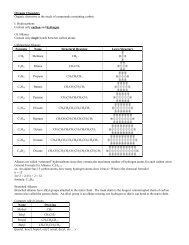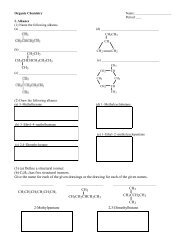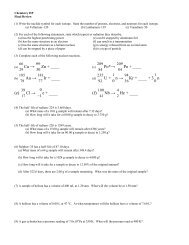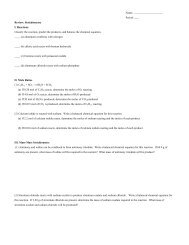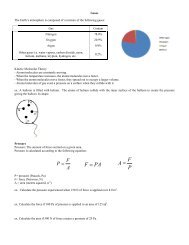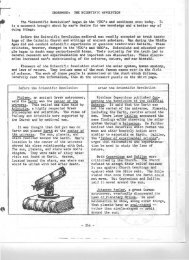Lincoln: Lincoln personally favored leniency, as he feared the South would continueresistance otherwise. This was reflected in his Proclamation of <strong>Am</strong>nesty andReconstruction [December 1863], which introduced the 10% Plan – i.e. once 10% of a state’spopulation as established by the 1860 election took an oath of loyalty they could establish agov’t. This was applied in Louisiana, Tennessee and Arkansas in 1864 [“Lincoln Gov’ts”].Congress: Congress felt the South deserved more of a punishment. Radical Republicans, ledby Thaddeus Stevens and Charles Sumner, even proposed the theory of state suicide [theSoutherners had destroyed their status as states through rebellion and had to be treated asconquered foreign lands]. This was incorporated into the Wade-Davis Bill [July 1864], whichdemanded that, to be readmitted, states had to have: (1) a majority of white citizensparticipating in the new gov’t, (2) all voters/delegates under an oath declaring they neverhelped the Confederates, and (3) no votes for lieutenants and above and officials.- Lincoln pocket-vetoed the Wade-Davis Bill, prompting the Radical Republicans to issue the “Wade-DavisManifesto” to the papers [attacking Lincoln]. The debate was in full swing.- Nevertheless, in early 1865 Congress and Lincoln joined in passing two key measures. One was theThirteenth <strong>Am</strong>endment [January 31], which abolished involuntary servitude and gave Congress the powerto enforce the law. Then on March 3, 1865 Congress created the Freedmen’s Bureau, a federal aid agencythat was to deal with the mess created by the war. This later became controversial, as the Southernershated it and there was a question as to its constitutionality.*Johnson Takes Over Reconstruction*- After Lincoln’s assassination, Andrew Johnson, a Southerner, white supremacist, states rights supporter,and Unionist [he was the only senator from a seceded state to stay in the Union], took over theReconstruction process w/o Congress [it had recessed shortly before he took over]. Basically, Johnson’swhole policy can be summed up w/his slogan – “The Constitution as it is, and the Union as it was.”- But even though Johnson’s plan was aiming for continued denial of black civil rights [it included the policythat black suffrage could never be imposed on the Southern states by the federal gov’t], it initially seemed tofavor a change of leadership in the South that would eliminate the old planter aristocracy.- This was b/c it was stated that certain people [officers, officials, and *all Southerners w/property worthmore than $20,000] were not allowed to take the oath of loyalty that would allow them to gain amnesty.Instead, they had to apply personally to the President for a pardon.- But the whole idea of this plan went out the window when Johnson began issuing thousands of pardons,which let many planters return to the newly created state gov’ts. Most likely, this was b/c he hoped to makeReconstruction quick [end it before the Radicals get a chance to do anything].- So after only 8 months, Johnson declared Reconstruction <strong>com</strong>plete, allowing many former Confederates toreturn to Congress in December 1865.*Congress Challenges Johnson’s Authority*- Congress was not too thrilled about Johnson’s plan, especially b/c many of the planters had begunestablishing black codes on the local and state levels. Consequently, the Republican majority simplydecided to directly challenge Johnson by refusing to admit the ex-Confederates.- Congress justified its new role in Reconstruction by pointing out that the Constitution had given them themain power to admit new states. Still, there were many other Constitutional issues to sort out, such as theever-present question whether the Union had been broken or not.- Lincoln believed it had not; Johnson agreed but admitted the people responsible for the rebellion had topay [in theory]; moderates favored Congressional supervision; and radicals argued that the Union wasbroken and the South was a conquered nation.- Anyway, all of Congress knew that they had to have an alternative to Johnson’s program ready for the1866 elections. Since a conservative coalition was out of the question after Johnson and the Democratsinsisted that Reconstruction had already ended, it all came down to the moderate and radical Republicans.- First, they attempted another <strong>com</strong>promise w/Johnson in spring 1866 – the Johnson policy would continuew/only 2 modifications: extension of the life of the Freedmen’s Bureau and the passage of the Civil RightsBill of 1866, which would force Southern courts to practice equality before the law by allowing the federalgov’t to take over unfair cases [but only in public acts of discrimination]. But this flopped when Johnsonvetoed both bills, revealing his racism. The bills overrode his veto and passed anyway, though.*The Fourteenth <strong>Am</strong>endment and the Beginning of Congressional Reconstruction*- After that, all chances of cooperation between Johnson and Congress were dead, so Congress wentahead and began its own program, urged on by the increasing reports of anti-black violence in the South.40
- The result was the Fourteenth <strong>Am</strong>endment, which had four key elements: (1) the freedmen were givencitizenship and the states were prohibited from denying their rights, (2) the Confederate debt was void, butthe US debt remained, (3) Confederate leaders were barred from holding office, and (4) if S. states didn’t letblacks vote, they were to have their representation reduced proportionally. *The last part irritated supportersof the women’s rights movement [we’re being ignored] and encouraged leaders like Stanton and Anthony.- Naturally, Johnson tried to block the Fourteenth <strong>Am</strong>endment in both the North and the South, urgingSouthern state legislatures to vote against ratification and organizing a Nat’l Union Convention in the Northand going around giving really bad speeches criticizing the Republicans [“traitors”]. To make a long storyshort, he wasn’t exactly Mr. Popularity.*The Congressional Reconstruction Acts*- Meanwhile, the Republicans dominated the 1866 Congressional elections, which they saw as a mark ofapproval for their plan. Nevertheless, nothing could be done w/the planter dominated “JohnsonGovernments” still in the South. Therefore, Congress decided that the states would have to be reorganized.- This decision led to a series of Reconstruction Acts passed through 1867 and 1868. The basis of the planwas established in the first Reconstruction Act [March 1867], in which Union generals assumed control inthe five different military districts that were established in the South. The troops were charged w/supervisingelections, among other things.- The act also guaranteed freedmen the right to vote and forced S. states to ratify the 14th <strong>Am</strong>endment, toratify their new constitutions by majority vote, and to submit them to Congress for approval. The rest of theacts, passed between March 1867 and March 1868, dealt w/the details.- The Reconstruction Acts successfully limited Johnson’s power, but some of the Radical Republicans werestill unsatisfied, as their proposal for land redistribution, which they felt would provide much neededeconomic equality, did not win popular support b/c the North liked a limited gov’t.*Johnson and Congress Struggle for Control*- Johnson continued to oppose Congressional policies, so Congress began to pass a series of laws toextend its influence. For instance, it set the date for its own reconvening [unheard of] and limited Johnson’spower over the army by forcing him to issue orders through Grant alone, who couldn’t be fired w/o theirapproval. Most important was the Tenure of Office Act, which gave the Senate power to approve changesin the Cabinet [designed to protect Secretary of War Stanton]. All of this was passed over Johnson’s vetoes.- In response, Johnson issued orders to <strong>com</strong>manders in the South limiting their powers, removed some ofthe best officers, and gave the governments he created in 1865 more power. Lastly, he tried to fire Stanton,which was the last straw as far as Congress was concerned.- Consequently, Congress impeached Johnson, indicting him for violating the Tenure of Office Act. He wastried in the Senate, where the Radicals tried to prove that he was guilty of high crimes and misdemeanors,but the measure failed to pass by one vote. Johnson stayed with only a few months left in his term.*The Presidential Election of 1868 and the Fifteenth <strong>Am</strong>endment*- In the Presidential Election of 1868 Union general Ulysses S. Grant ran against and defeated the NewYork Democrat Horatio Seymour. Although Grant was not a Radical, he supported CongressionalReconstruction and black suffrage. On the other hand, the Democrats ran a white supremacist campaign.- Both sides used the war as a campaign tactic [waving the “bloody shirt”], but the Democrats unwiselyassociated themselves w/Johnson and the rebels, which contributed to their defeat. Additionally, blackvoters helped Grant emerge victorious.- But once in office, Grant was not the big time supporter of Reconstruction many had hoped he would be,as he never insisted on a full military occupation of the South.- Still, during his term the Radicals were able to pass the Fifteenth <strong>Am</strong>endment [ratified in 1870], whichattempted to write equality into the constitution by forbidding states to prohibit the right to vote based onrace, color, or previous condition of slavery. The problem w/the law was that it allowed states to restrictsuffrage on many other grounds [sometimes using bogus “literacy” exams].- After the 15th <strong>Am</strong>endment, the North began to lose interest in Reconstruction, as most considered that ithad been <strong>com</strong>pleted.*The Reconstruction Governments in Power*- So what did all these laws actually do? Well…e/t many white Southerners tried their best to sabotage blackcivil rights and participation in government, the new Southern Republican party came to power in theconstitutional conventions of 1868 to 1870 [due in some part to enthusiastic black voting].41
- Page 3 and 4: Congregationalists (Puritans) - The
- Page 5 and 6: - So the Restoration Colonies, form
- Page 7 and 8: - So in England, where they were lo
- Page 9 and 10: *Colonial Politics 1700-1750: Relat
- Page 11 and 12: - Another ideology that was beginni
- Page 13 and 14: - The Quebec Acts were passed aroun
- Page 15 and 16: - So, by 1782, what had seemed to b
- Page 17 and 18: on the economic side, since the gov
- Page 19 and 20: - Anyway, Congress had several ques
- Page 21 and 22: - Adams was still in the early Wash
- Page 23 and 24: *Political Factionalism and Jeffers
- Page 25 and 26: - Samuel Slater set up the first te
- Page 27 and 28: - Court rulings extended the powers
- Page 29 and 30: Revival, Reform and Politics during
- Page 31 and 32: - Anyhow, during his administration
- Page 33 and 34: TEXAS (Southerners) - Texas had bee
- Page 35 and 36: - Anyhow, Pierce’s total support
- Page 37 and 38: They had a smaller everything: smal
- Page 39: - The two Northern victories at the
- Page 43 and 44: The Slaughter-House Cases (1873) -
- Page 45 and 46: in the arrest of 8 immigrant radica
- Page 47 and 48: case (1897 - ICC can’t set rates)
- Page 49 and 50: - The Populists prepared to run aga
- Page 51 and 52: - MOST IMPORTANTLY, though, was the
- Page 53 and 54: - So, what led the US to undertake
- Page 55 and 56: - The rebellion, led by Emilio Agui
- Page 57 and 58: - Still, Americans managed to turn
- Page 59 and 60: - So - the point of this episode? B
- Page 62 and 63: *Hoover’s Response*- Poor Herbert
- Page 64 and 65: - In FDR’s second term, however,
- Page 66 and 67: Dominican Republic - When we left i
- Page 68 and 69: World War II (1941 - 1945)*The Cour
- Page 70 and 71: - So Truman started off again all c
- Page 72 and 73: - First of all, the 1950s were (for
- Page 74 and 75: peace w/Japan that ended occupation
- Page 76: - France wanted out, so at the Gene



